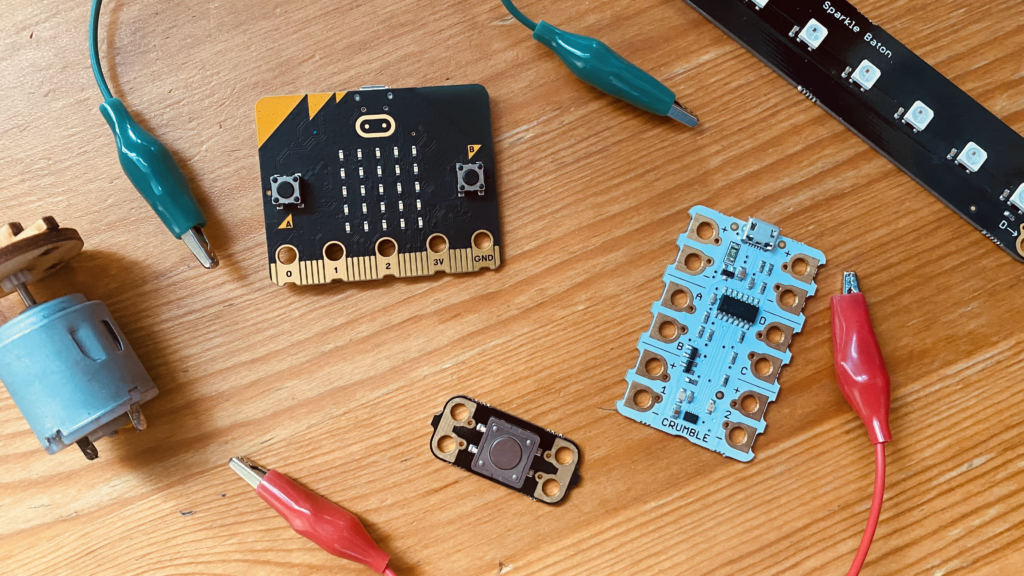Which device is best for primary school physical computing? BBC micro:bit Vs The Crumble controller

In the realm of educational microcontrollers, the BBC micro:bit and the Crumble controller from Redfearn Electronics stand out as two prominent contenders, each with its unique set of features and capabilities.
These devices cater to Key Stage 2 students and beyond, aiming to introduce students to the exciting world of programming, electronics and what can be defined as physical computing. Physical computing involves using hardware to interact with the digital world through programmable devices. It is incorporated into the curriculum to provide students with hands-on experiences where they write code to make things happen in the real world. But which device is best for primary school physical computing?
This article will delve into the effectiveness, adaptability, affordability, and overall pros and cons of both products to aid educators and enthusiasts in making an informed choice.
Effectiveness:
BBC micro:bit:
Pros:
- Feature-rich programming environment with a user-friendly interface.
- Wide array of built-in sensors, including accelerometer and magnetometer, light and temperature sensors.
- Compatibility with multiple programming languages, such as MakeCode, JavaScript and Python.
- A huge collection of online resources for students or educators to help you get started and extend your learning.
Cons:
- Limited onboard memory.
- Single-board design may limit certain project possibilities.
Crumble Controller:
Pros:
- Simple drag-and-drop programming interface suitable for beginners.
- Modular design with easily connectable components.
- Focus on analogue input/output for enhanced project flexibility.
- Perfect for lower Key Stage 2 students and linking to Design and Technology projects.
Cons:
- Limited onboard sensors compared to the micro:bit.
- Programming options may be considered too basic for more advanced users.
Adaptability:
BBC micro:bit:
Pros:
- Extensive range of add-ons and accessories available.
- Strong online community support for sharing projects and troubleshooting.
- Integration with various platforms and devices.
Cons:
- Potential learning curve for beginners due to the abundance of features.
- Requires additional components for some advanced projects or projects using motors.
Crumble Controller:
Pros:
- Versatile modular design allows for easy expansion and customisation.
- Seamless integration with other Crumble controllers for collaborative projects.
- Intuitive design makes it suitable for a wide range of age groups.
- Perfect for D&T projects involving motors
Cons:
- Limited third-party accessories compared to the micro:bit.
- Less extensive online community support.
Affordability:
BBC micro:bit:
Pros:
- Competitive pricing, especially for bulk purchases.
- Frequent discounts and promotions, making it cost-effective for educational institutions.
- The BBC's recent Next Gen scheme has already equipped many schools with these great devices!
- Working 1:2 students is a great way to deliver lessons and reduces costs.
Cons:
- Additional costs for accessories and components may increase the overall investment.
- The budget may limit some schools or organisations.
Crumble Controller:
Pros:
- Cost-effective base unit, making it accessible for schools with budget constraints.
- Affordable add-on modules for customisation.
- Class set package available which includes lots of resources.
Cons:
- Limited built-in features compared to the micro:bit.
- Potential additional costs for expanding the system with modules.
Conclusion:
So which device is best for primary school physical computing? Both the BBC micro:bit and the Crumble controller offer unique advantages and cater to different educational needs. The micro:bit stands out with its feature-rich environment and extensive sensor capabilities, making it suitable for more advanced users. On the other hand, the Crumble controller excels in simplicity, affordability, and adaptability for younger learners or budget-conscious schools.
For schools or educators aiming for a comprehensive and versatile platform with a wealth of features, the BBC micro:bit is recommended. However, for those prioritising affordability, simplicity, and adaptability, the Crumble controller is a valuable option. Ultimately, the choice between the two depends on the specific educational goals, target audience, and budget constraints.

